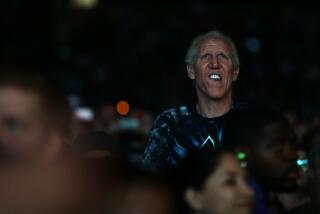Basking in a novel life after the Dead
- Share via
Robert Hunter laughs at the irony as he turns the image over in his head: the solitary writer, secluded in a cabin along Northern California’s Russian River, churning out the Great American Novel.
“I’m finally turning into just what they always said I was -- a reclusive writer,” Hunter says with a chuckle during what is scheduled to be a brief telephone conversation but stretches to nearly two hours as he expounds on 30 years as the Grateful Dead’s principal lyricist, the band’s place in history and his newest writing endeavor.
Asked last spring to compose a foreword to David Dodd’s book, “The Complete Annotated Grateful Dead Lyrics,” Hunter, 64, responded not by shunning the spotlight but with a lengthy, illuminating history of his songwriting partnership with the band’s primary composer, lead guitarist Jerry Garcia.
“When I got done with that I found I enjoyed writing it so much that I said, ‘Hey, let’s keep writing,’ ” he recalled. “I’ve finished one novel since then and I’m five chapters into another one.”
The first book is “Doppelganger,” the name for the twin that, according to mythology, each of us has somewhere in the world. Hunter is loath to describe it in detail before publication, except to note that it puts to use the quantum mechanics theory of physics and includes “a whole lot of doppelgangers.” He’s waiting on word from his publisher on when it will be released.
“I feel I’ve got 10 books in me,” Hunter says, speaking not from his secluded writing cabin but from the San Francisco Bay Area home he shares with his wife, Maureen, and their teenage daughter, Kate. His voice, normally a booming baritone, sounds surprisingly frail as he recovers from dental and knee surgery.
“Frail! I like that word,” Hunter says, evaluating the choice. “Yes, that describes it well.”
Words have been Hunter’s passion since one day in 1949 when he discovered the world around him and his place within it “as a character in time.”
Around that time he also became aware of music, which led him to study cello, violin, trumpet, bagpipes and guitar.
Early music influences included Pearl Bailey, Bessie Smith and Josh White. Later, he added to the eclectic mix Woody Guthrie, the operettas of Gilbert and Sullivan and the literary works of James Joyce.
“Sometimes, when I start feeling less than humble, I look at Joyce again and he puts me right in my place,” Hunter says.
Not that he is particularly humble when it comes to the influence of the Grateful Dead’s music. Forty years after the band’s formation -- and 10 years since Garcia’s death -- Hunter is not surprised that the music endures. “I probably just always had some conceited belief that it would,” he says.
Known for lyrics with a dramatic flair and a timeless quality that leave many listeners feeling as if they have heard them before, Hunter was likely as responsible for the band’s success as any of the musicians who sang his words, says Steve Silberman, coauthor of the encyclopedic Grateful Dead source book “Skeleton Key.”
“I believe the Grateful Dead would have inspired much less of an emotional loyalty in their fans without his lyrics,” Silberman says.
While Garcia traveled the world for 30 years as the Grateful Dead’s unofficial front man, Hunter often stayed in the shadows. Rarely granting interviews, never joining the group on stage, allowing his picture to be placed on only one of the band’s albums, he became an enigma to all but the most ardent followers.
Yet he also recorded several albums of his own, including “Tales of the Great Rum Runners,” “Tiger Rose” and “Amagamalin Street,” and published several volumes of poetry, including “Night Cadre,” “Sentinel” and “Idiot’s Delight.”
Now, however, he has cast much of that aside in favor of concentrating on novel writing.
“I know my time is dwindling, and I know more at this age. I don’t think I could have written these novels 10 years ago.”
More to Read
Sign up for our Book Club newsletter
Get the latest news, events and more from the Los Angeles Times Book Club, and help us get L.A. reading and talking.
You may occasionally receive promotional content from the Los Angeles Times.






